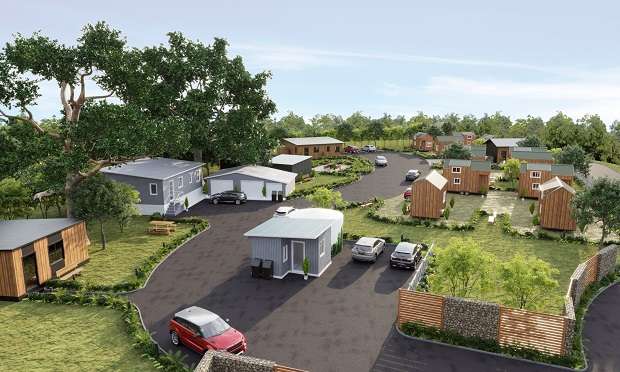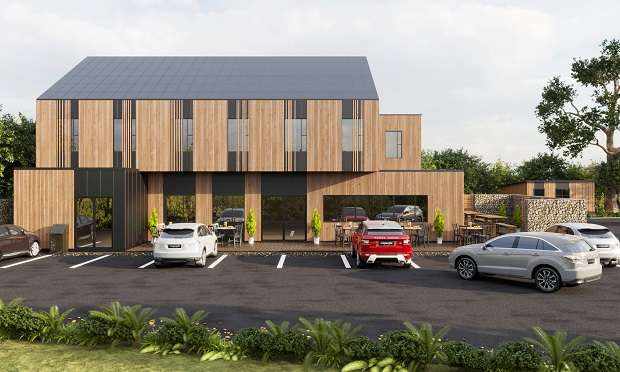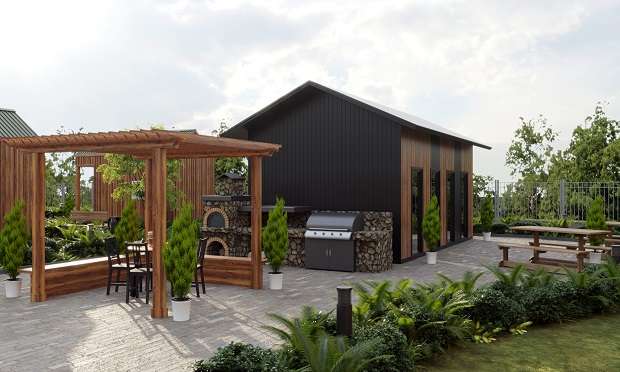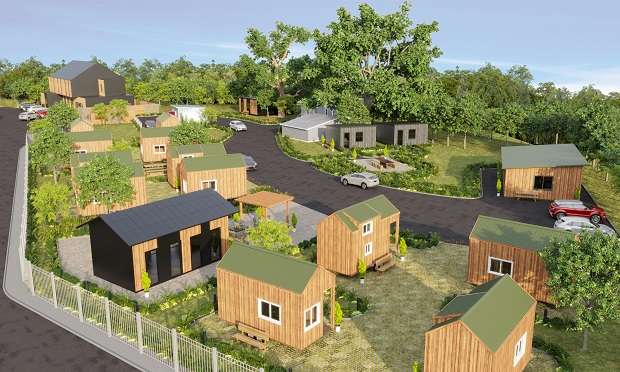New Zealand’s first tiny house village will be opening in Muriwai this spring.
Entrepreneur and property investor Kyron Gosse has finally done what many could not in New Zealand, figuring out how to legally accommodate tiny houses on wheels.
The village will be on the site of the Muriwai campgrounds and lodge, using a model that Gosse calls Freedom Village that will be owned by the residents.
“It is structured so that each of them buys into the actual holding company, with a licence to occupy,” he says. “Each [house owner] owns a share of the land, and will also earn a percentage of the profits of the café to meet their expenses.
Start your property search
“My big long term vision is that one day they will be able to live for free from that income.”

The village will have sites for 18 owner-built tiny houses on wheels as well as a community cafe and co-working space. Photo / supplied
Gosse calls the model, which is a first for New Zealand, a form of co-tiny housing, with the distinction that while he builds the infrastructure, each owner builds their own house.
The purchase of the Muriwai campground, with its mix of cabins and caravans included the Muriwai Lodge Store , which Gosse plans to turn into a whole foods, plant based café - the former chef is already in talks with an operator – while the upstairs becomes a co-working space for the community.
“This is a place for visitors to Muriwai as well as tiny house owners, a place to meet and socialise, to collaborate and grow. “
Gosse’s plan is for 18 tiny houses on the 8477 sq m site close to the beach, all built by their owners. Because the houses are all on wheels, the village complies with the 1985 Campground Act, solving the problem for many would-be tiny house owners.
“I decided in mid-2018 to stop talking about it and start making it happen. But then I had to figure ‘where can we do this?’ a whole community living in tiny houses.”

The former lodge and store will become a whole foods cafe, with a co-working space on the upper floor. Photo / supplied
Gosse, who became interested in tiny house movement about four years ago and was a founding member of the New Zealand Tiny House Association formed last spring, was aware that many tiny housers struggled with working their way through the regulations, which differed by each council jurisdiction. The tiny house he lives in is council- legal as the property is zoned for multiple dwellings.
He realised that under the Caravan Act each local authority has quite clear-cut rules about caravans, and people are allowed to permanently live in caravans – or tiny houses on wheels.
Finding the Muriwai campground was a “fall in love” moment for Gosse, who could immediately envisage what it could become. He says that the vendors, who do not want to be named, really bought into the vision and worked hard to make the sale happen.

The developer envisages a community that collaborates and shares social spaces. Photo / supplied
Gosse says that the village will solve not just affordable housing problems – the lots are expected to sell for around $200,000 – but also, importantly, create a community that lives, even works, together. His work as a futurist means he’s seeing global trends for houses that can move in response to weather events, earthquakes or rising sea levels from climate change.
Gosse, who has another contract in the works, is sure that this model of tiny house villages, housing people from babies to 70 year olds, is solving global, not just local problems.
While occupation isn’t planned until the spring, he has already has pre-sales from the keen tiny house community he is part of.

Houses will all be individual designs, but fit well into the style of Muriwai community. Photo / supplied
Bayleys agent Jayne McCall, who with Scott Kirk brokered the deal, says she is really excited about Gosse’s plans for the campground, which has not been on the market for over 50 years.
“It is an icon. I’d heard of tiny houses, I love the idea. It will suit the Muriwai community, who will enjoy and embrace it. And his ideas for the lodge are brilliant.”
McCall, who lives just down the road and has already warned Gosse he’d better keep up the standard of the coffee, says that locals are super-excited and that the design is tuned to the ethos of the Muriwai area.

